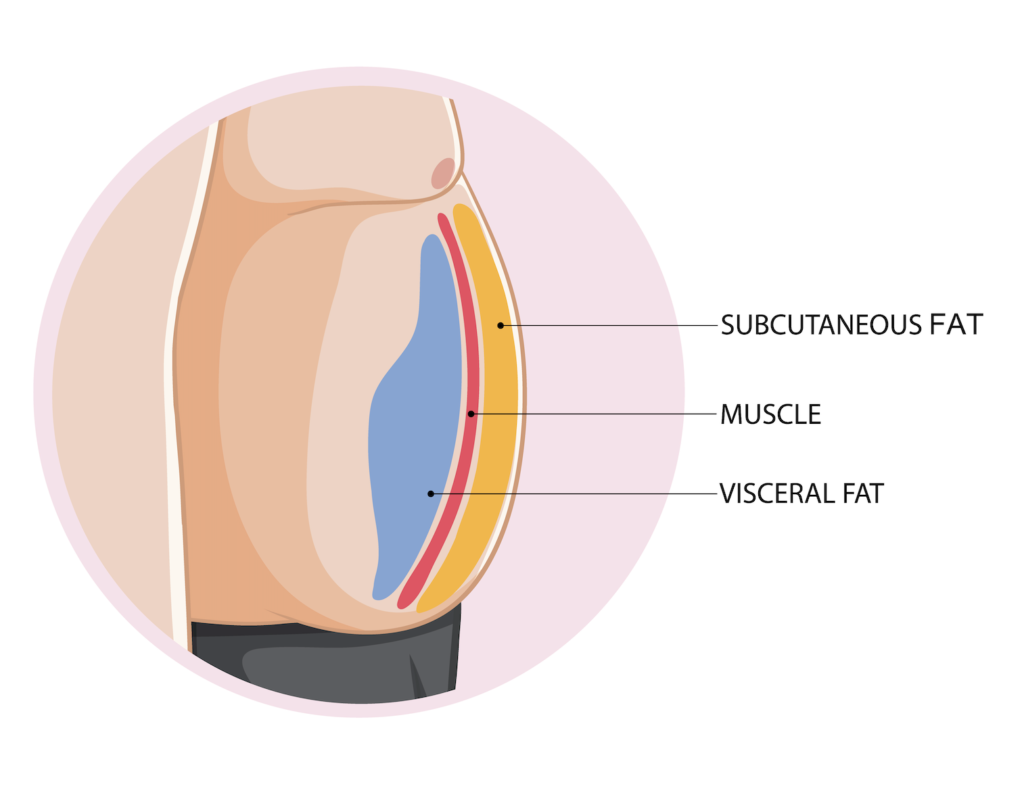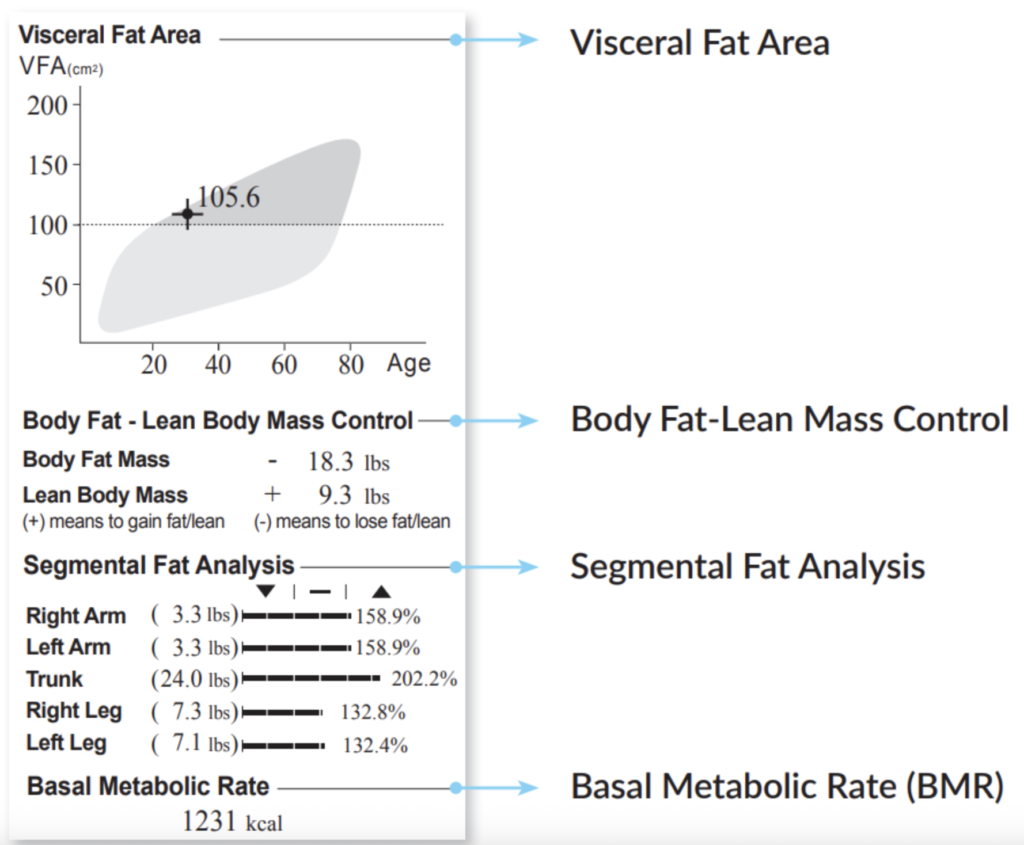
Let’s talk about something that most people don’t even know exists, but should.
As nutritionists, one of the most important conversations we have with our clients is to focus less on the number on the scale and more on what’s happening inside their bodies. Because here’s the thing: not all fat is created equal.
Most of our clients come to us wanting to decrease their body fat; however, not all fat poses the same health risks. While subcutaneous fat (the kind you can pinch) sits just under your skin, visceral fat wraps around your vital organs deep in your abdominal cavity. This hidden fat is metabolically active and can significantly impact your health, even if you appear to be at a healthy weight.

What Is Visceral Fat?
Think of it this way: subcutaneous fat is the soft, pinchable stuff that sits right under your skin. It’s the fat you can grab.
Visceral fat is packed deep in your belly, wrapped around your liver, pancreas, intestines, and other vital organs. And unlike the fat you can pinch, it is metabolically active, meaning it’s constantly releasing hormones and inflammatory compounds into your bloodstream.
Not great.
This is why someone can look relatively slim but still have health problems. You might be at a “normal” weight on the scale, but if you’re carrying too much visceral fat, your health could be at risk.
Why Visceral Fat Matters
Visceral fat isn’t just stored energy; it’s biologically active tissue that releases inflammatory compounds called cytokines. These substances can trigger chronic low-grade inflammation throughout your body, increasing your risk for:
- – Type 2 diabetes and insulin resistance
- – Cardiovascular disease
- – High blood pressure and cholesterol
- – Certain cancers
- – Alzheimer’s disease and cognitive decline
- – Fatty liver disease
Research shows that excess visceral fat can also interfere with blood flow to the brain, potentially affecting memory and emotional regulation. The good news? Visceral fat responds remarkably well to dietary changes.
What Causes It?
A few things can cause visceral fat to pile up:
Your diet: Too much sugar, refined carbs (think white bread, pastries, chips), and processed foods can increase visceral fat storage. These foods cause rapid blood sugar spikes and insulin surges, signalling your body to store fat around your organs.
Chronic Stress: When you’re stressed out all the time, your body pumps out cortisol, a hormone that loves to store fat right in your belly and increase your cravings for high-calorie foods.
Aging and hormones: As we get older, our hormones shift (especially for women going through menopause), and that can lead to more visceral fat.
Lifestyle factors: Poor sleep quality, excessive alcohol consumption, and sedentary behavior all contribute to visceral fat gain.
The good news? You have way more control over this than you think.
Nutritional Strategies to Reduce Visceral Fat
The most effective approach to reducing visceral fat combines smart nutrition with lifestyle modifications. Here are evidence-based strategies we recommend:
1. Prioritize Protein at Every Meal
Adequate protein intake (0.7-1.0g per pound of body weight) helps preserve lean muscle mass while promoting fat loss. Protein also increases satiety and has a higher thermic effect than carbohydrates or fats, meaning your body burns more calories digesting it.
Include: Lean meats, fish, eggs, Greek yogurt, legumes, tofu, and tempeh.
2. Choose Quality Carbohydrates
Replace refined carbohydrates with fibre-rich whole grains, vegetables, and fruits. Fibre slows digestion, stabilizes blood sugar, and feeds beneficial gut bacteria that help regulate metabolism and inflammation.
Focus on: Vegetables, berries, oats, quinoa, sweet potatoes, and legumes. Aim for 25-35g of fibre daily.
3. Embrace Healthy Fats
Despite decades of fat-phobia, research shows that healthy fats, particularly omega-3 fatty acids and monounsaturated fats, can actually help reduce visceral fat accumulation and inflammation.
Include: Fatty fish (salmon, sardines, mackerel), avocados, nuts, seeds, extra virgin olive oil, and olives.
4. Limit Added Sugars and Refined Carbs
Excess sugar and refined carbohydrates are strongly linked to visceral fat accumulation. These foods cause insulin spikes that promote fat storage around organs.
Minimize: Sugary beverages, candy, baked goods, white bread, pasta, and processed snacks.
5. Consider Meal Timing
Some research suggests that eating within a consistent window (such as 10-12 hours) and avoiding late-night eating may help reduce visceral fat by improving metabolic rhythms and insulin sensitivity.
6. Stay Hydrated and Limit Alcohol
Adequate water intake supports metabolism and helps control appetite. Excess alcohol, particularly beer and sugary mixed drinks, is strongly associated with visceral fat gain.
7. Manage Stress Through Nutrition
Include foods rich in magnesium, B vitamins, and omega-3s that support healthy stress responses. Consider adding adaptogenic herbs like ashwagandha or regular consumption of green tea, which contains compounds that may specifically target visceral fat.
The Importance of Measuring Visceral Fat
You can’t manage what you don’t measure. That’s why we use body composition testing in our practice.

Unlike traditional scales or BMI calculations, body composition technology provides a detailed analysis of your body composition, including a precise measurement of your visceral fat level. This medical-grade assessment takes just minutes and gives us valuable insights into:
- – Your visceral fat area (in cm²)
- – Skeletal muscle mass
- – Body fat percentage and distribution
- – Metabolic health markers
This data allows us to create truly personalized nutrition plans and track your progress with objective metrics that matter for your health, not just your weight (but we can help with that as well, if that’s your goal).
Regular testing helps us see what’s working and adjust your nutrition strategy accordingly. Many clients are surprised to discover they have elevated visceral fat even at a “normal” weight, making this testing invaluable for uncovering hidden health risks.
Ready to Take Control of Your Health?
If you’re concerned about visceral fat or want to optimize your body composition, we’re here to help. Our personalized programs include body composition testing to establish your baseline and track your progress. Book your free consultation HERE.
This information is provided for educational purposes and does not constitute medical advice. Please consult with qualified Nutritionist or healthcare professionals before making significant changes to your diet or lifestyle.



